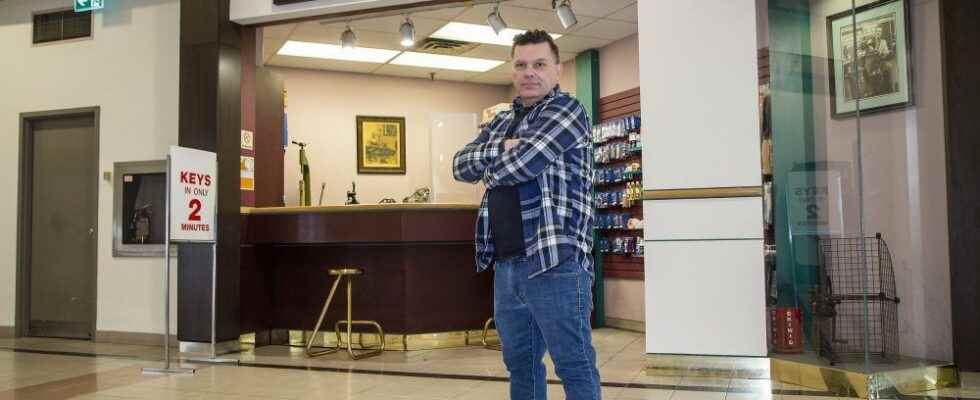A niche sector of London retailing is being hit hard by COVID-19, as the virus drives people from offices.

A niche sector of London retailing is being hit hard by COVID-19 as the virus keeps people from offices.
This advertisement has not loaded yet, but your article continues below.
The shops that repair shoes, cut keys, repair handbags and other leather goods, and sharpen tools and knives have seen business disappear once again in this latest wave of the pandemic. And with government support programs changing, they fear they are falling through the cracks.
“This is destroying small business. Government has to help. We need support,” said Joe Serratore, owner of Serratore Shoe Repair outlets in Citi Plaza and Talbot Center downtown.
With workers not going into nearby offices and GoodLife Fitness temporarily shut down during the current Omicron restrictions, Serratore has seen daily traffic of more than 30 customers at Citi Plaza dwindle to two or three a day, he said.
“I had a driving business. I don’t know whether to cry or give up,” he said.
Serratore said he has spent his savings and is now $40,000 in debt, taking government loans, to keep the business going. He has tried to change his business by selling personal protective equipment, such as masks and gloves. It has helped, but may not be enough.
“We had people from GoodLife, London Life, the TD towers (City Centre), One London Place and the city. They all came by and dropped off shoes,” Serratore said of times before the pandemic arrived.
He is a partner with his brother Anthony, who operates the business at Talbot Centre.
“It has been so dead since COVID started. We have been going downhill really bad, we’re barely getting by,” Anthony said. “There’s no one here. We see three or four people a day.”
This advertisement has not loaded yet, but your article continues below.
Anthony, who has operated the Talbot Center shop since 1992, said he would average about 35 to 40 customers a day before the pandemic. “I have never seen anything like this,” Joe said. “I’m fed up. We’re in a bad situation.”
He’s not alone, and it’s not solely a downtown issue.

Luigi Del Guercio at Westown Shoe Clinic has been at Cherryhill Village Mall for about 45 years. Amid the pandemic, business has been slashed by more than half.
“I think people are afraid to go out. No one comes around. This is hitting us hard,” he said.
Del Guercio, 67, has cut two staff and now works the store alone at a time of his life when he wanted to step back from the business.
At White Oaks Shoe Repair at Southdale Road and Adelaide Street, Zak Alkahwaji has also seen a sales slump. “It’s really down, way down. In winter it should be a busy time for us, but the pandemic has really hurt us. It hasn’t picked up at all.”
There is government support for small business, although the conditions that need to be met for some programs have been tightened, said Phil Singeris, small business adviser with the London Small Business Centre.
The provincial government this month announced the Ontario Small Business Support Grant of $10,000 and has eased the eligibility for a similar grant it offered last year, but it is not yet accepting applications, he said.
The province is also offering some rebates on taxes and energy costs to businesses that qualify.
Federally, Ottawa is still offering rent and wage subsidies under the Hardest Hit Business Recovery Program. And the Canadian Emergency Business Loan was expanded to $60,000 in 2021, with $20,000 of that forgivable and the deadline to repay extended to the end of 2023.
This advertisement has not loaded yet, but your article continues below.
“Businesses that have survived have to show a significant drop in sales. If they have pivoted or reinvented themselves to keep their doors open, they may not qualify,” Singeris said. “Businesses are trying to navigate the landscape.”
Peter Fragiskatos, Liberal MP for London North Centre, said he spoke to Joe Serratore in November about his situation, laying out what’s available in government support.
“We have engaged with a lot of constituents. We’ve tried to help. The pandemic has evolved, but so have the programs,” he said.
Benefits for workers began with the Canada Emergency Response Benefit (CERB) that became the Canada Recovery Benefit (CRB) and is now the Canada Worker Lockdown Benefit. There are also support programs for large employers, such as one accessed by GoodLife in 2021 that gave the fitness company a $310-million loan.
Serratore fears he may not qualify for these new grant and loan programs.
For him, the business is more than a job. His great uncle opened the business in downtown London in 1924, his father Frank took it over in 1958 and he stepped in in 1979.
He is now two years away from celebrating the 100th anniversary of the business and fears he will not make it.
“How can I survive with no traffic, no business? This is not about me. All these small businesses – dry cleaners, hair salons, shoe repair shops – it is everybody.”
